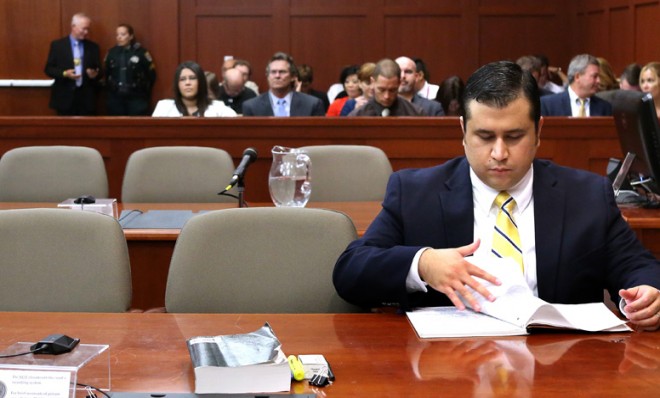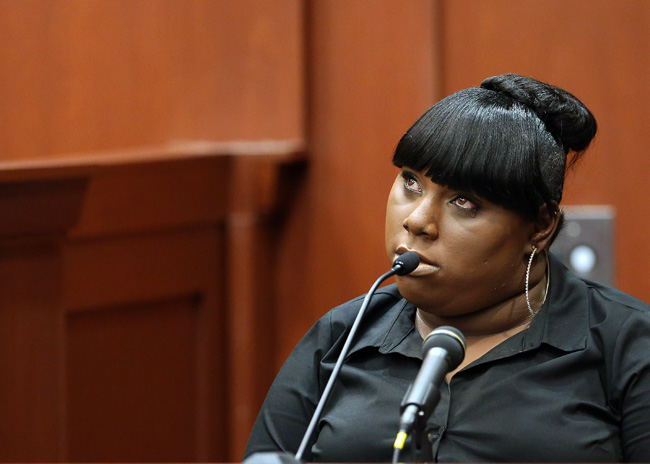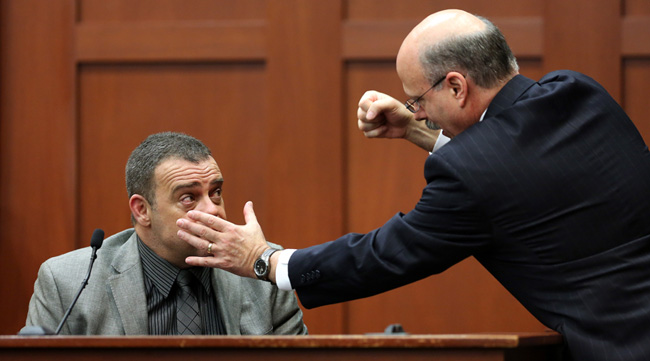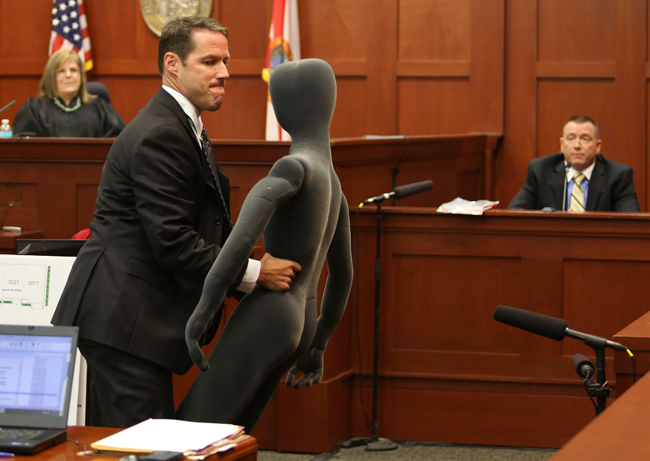The George Zimmerman trial: A day-by-day recap [Updated]
The polarizing Zimmerman is on trial for second-degree murder in the shooting death of 17-year-old Trayvon Martin

A free daily email with the biggest news stories of the day – and the best features from TheWeek.com
You are now subscribed
Your newsletter sign-up was successful
On Feb. 26, 2012, George Zimmerman, 28, called police to report "a real suspicious guy" walking through Twin Lakes, a gated community in Sanford, Fla., located near Orlando.
That turned out to be Trayvon Martin, 17, who was returning to his father's fiancee's home from 7-Eleven carrying a bag of Skittles, a can of iced tea, and his cellphone.
The trial looks to settle what happened next. We know that Zimmerman shot Martin in the chest with a Kel-Tec PF-9 9mm pistol. We don't know with certainty why, or how it happened.
The Week
Escape your echo chamber. Get the facts behind the news, plus analysis from multiple perspectives.

Sign up for The Week's Free Newsletters
From our morning news briefing to a weekly Good News Newsletter, get the best of The Week delivered directly to your inbox.
From our morning news briefing to a weekly Good News Newsletter, get the best of The Week delivered directly to your inbox.
The prosecution says that Zimmerman profiled the unarmed teenager because he was black, followed him against the recommendations of the police, and then committed second-degree murder.
The defense claims that Zimmerman shot Martin in self-defense after the 17-year-old knocked him to the ground and began to beat his head into the concrete.
Zimmerman faces life in prison if convicted. Here is what has happened in the trial so far:
Monday, June 24, 2013
A free daily email with the biggest news stories of the day – and the best features from TheWeek.com
"We are confident that at the end of this trial you will know in your head, in your heart, in your stomach that George Zimmerman did not shoot Trayvon Martin because he had to," says prosecutor John Guy to open the trial. "He shot him for the worst of all reasons, because he wanted to."
Zimmerman's attorney, Don West kicks off his defense with a knock-knock joke meant to illustrate the difficulty of getting his client a fair trial:
Knock knock.Who's there?George Zimmerman.George Zimmerman who?Good, you're on the jury.
West makes the case that Martin was armed with a deadly weapon — the concrete sidewalk, which he called "no different than if he picked up a brick or smashed his head against a wall."
Tuesday, June 25, 2013
The focus turns to Zimmerman's role in the neighborhood watch and whether he had a history of reporting black males to the police. The prosecution plays four calls of Zimmerman warning police about black men he witnessed in the neighborhood after break-ins.
Donald O'Brien, president of the Twin Lakes homeowners association, testifies that the neighborhood watch volunteers were told to stay away from suspicious people and call police instead.
Wednesday, June 26, 2013

Rachel Jeantel, 19, testifies that she was talking on the phone with Martin right before the shooting and heard him say, "Why are you following me for?" and "Get off, get off" before the call was disconnected. Two other eyewitnesses claim they heard a boy, who they believe was Martin, cry out for help during a struggle outside.
Thursday, June 27, 2013
Zimmerman's defense attorney cross-examines Jeantel, questioning the veracity of her past statements to police and asking her if Martin used the term "cracker" to describe white people. He also asks her why a letter she wrote to Martin's mother describing the events didn't mention race as a factor in the shooting.
Later, Jenna Lauer, a resident of Twin Lakes who called 911 after hearing "yelping" outside, testifies that she couldn't identify which of the two men was yelling for help.
Friday, June 28, 2013
John Good, Zimmerman's neighbor, testifies that he saw Martin straddled on top of Zimmerman throwing down punches in a "ground and pound," a term from mixed martial arts. He says that he could not tell whether it was Martin or Zimmerman calling for help and that he could not actually see any of the punches connect.
Monday, July 1, 2013
The prosecution plays four statements Zimmerman made to police, pointing out inconsistencies in his story, including different accounts of what Martin supposedly said to Zimmerman as he allegedly approached.
Chris Serino, the case's lead detective with the Sanford Police Department, testifies that he doubts Martin landed 25 to 30 blows as Zimmerman claims.
Tuesday, July 2, 2013

Serino testifies that there were no "major" differences in Zimmerman's various statements to police, and that Zimmerman seemed "very elated" when investigators told him that the incident could have been caught on tape.
Dr. Valerie Rao, a medical examiner who reviewed evidence of the case, says Zimmerman's injuries "were not life threatening... very insignificant." Rao claims that if Zimmerman was attacked as severely as he said he was, he would have suffered severe damage and bleeding; instead, she says, his injuries weren't bad enough to require stitches.
Wednesday, July 3
Military attorney Alexis Carter testifies that Zimmerman got an "A" in his criminal litigation course, which included information about Florida's "Stand Your Ground" law. The prosecution charges that Zimmerman lied about his knowledge of "Stand Your Ground" last year on Fox News, while the defense team argues that Zimmerman's actions were permissible under the law.
Friday, July 5
When asked if the voice heard screaming in the background of a 911 call belongs to her son, Sybrina Fulton, mother of Trayvon Martin, responds, "I heard my son screaming." Gladys Zimmerman, mother of the defendant, identifies the voice as "My son, George."
Monday, July 8
Sanford police officer Chris Serino says that when he asked Tracy Martin whether the voice crying for help on a 911 call belonged to his 17-year-old son, Trayvon Martin, he "looked away and under his breath, as I interpreted it, said 'no.'" The prosecution posits that Tracy Martin might have just been expressing denial at his son's death.
On the stand, Tracy Martin denies Serino's story, saying, "I was listening to my son's last cry for help."
The defense team brings in five people: Mark and Sondra Osterman, who refer to George Zimmerman as Mark's "best friend"; Leanne Benjamin and her partner John Donnelly, who says he considers Zimmerman almost "as a son"; and Zimmerman co-worker Geri Russo. They all say the voice on the 911 call belongs to Zimmerman.
Tuesday, July 9
Dr. Vincent DiMaio, the former chief medical examiner in San Antonio, Texas, testifies that the trajectory of the bullet and traces of gunpowder are "consistent with Mr. Zimmerman's account that Mr. Martin was over him, leaning forward at the time he was shot." When cross-examined, DiMaio concedes to the prosecution that it's possible that Martin was pulling away from Zimmerman at the time of the shooting. He also tells the court that he was paid $2,400 by the defense.
DiMaio goes on to say that it's likely that Martin was conscious for 10 to 15 seconds after being shot, which would make it possible for him to move his arms. Zimmerman initially said that he moved Martin's arms out to the side after the shooting, which appeared to contradict photos that found Martin with his arms under his body.
Wednesday, July 10

Dennis Root, a public safety consultant called by the defense, testifies that Martin was probably in better shape than Zimmerman. During cross-examination, the prosecution straddles a foam dummy to demonstrate that it would have been hard for Zimmerman to grab his gun with Martin on top of him, which is what the defense team claims happened. Root later agrees with the defense team that Zimmerman might have been able to reach around Martin's body to grab his gun.
When asked if the gunshot angle was consistent with Martin getting off of Zimmerman and backing away, Root replies, "It could be consistent with any kind of movement... We weren't there so the info that we have is George Zimmerman's statement."
After a testy spat with the judge, the defense waits until the last minute to inform the court that George Zimmerman will not testify. That makes the last defense witness Zimmerman's father, Robert Zimmerman, who identifies the voice yelling in the 911 call as his son's.
The defense rests its case. After rebuttal witnesses are called, both sides will make their closing arguments, and then the case will be sent to the jury.
Sources: ABC News, Associated Press, CBS News (2), Christian Science Monitor, CNN (2), HLN, Los Angeles Times, NBC News, Orlando Sentinel (2)(3), USA Today, Washington Post
Keith Wagstaff is a staff writer at TheWeek.com covering politics and current events. He has previously written for such publications as TIME, Details, VICE, and the Village Voice.